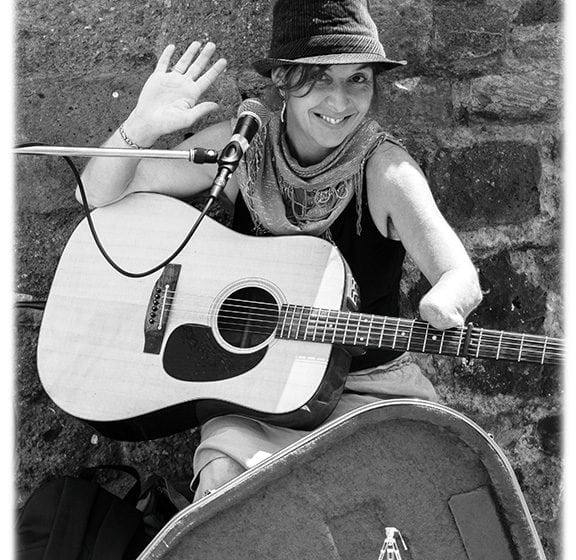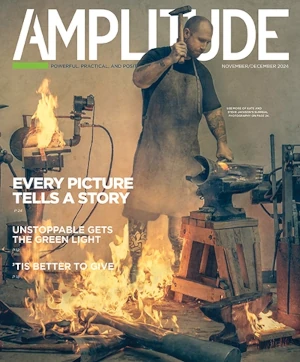By Elizabeth Bokfi
In 2004, musician and composer Tina Bridgman from Devon, United Kingdom, was a passenger in a car that slid off an icy road and into a tree.
After being extricated, Bridgman was transported to the hospital suffering from a broken collarbone, broken ribs, and a partially severed left hand. Unable to repair the partial amputation, surgeons completed a below-elbow amputation.
Depression and anxiety are common following amputation, and their intensity may be closely related to the type of amputation. Having the time to physically and emotionally prepare for surgery and having adequate input into the decision often gives the patient a sense of control over the situation, which results in an increased sense of well-being; on the other hand, having a traumatic amputation, such as one resulting from a car or industrial accident, often gives the person little or no time to process the experience. One day the limb is there; the next day it’s gone.
Devastated over her loss, Bridgman immediately focused on whether she would ever play the guitar again. “All the work I had ever done [in my lifetime] was with my hands,” says Bridgman. “Massage, second chef, working on organic farms….”
Amputees cope with their limb loss in different ways. For Bridgman, learning acceptance meant seeing her hand. “I knew I had to let grief happen,” she says, “so I asked them to bring me my hand [to] say goodbye…so I could have closure.”
While not everyone would handle the situation in the same manner, for Bridgman it was the beginning of a journey that would eventually find her gigging the music scene again. “I remember thinking of the school of thought that says we create our own reality, and that I don’t remember thinking, ever, that I wanted to lose a hand!” says Bridgman. “I wondered if I could ever trust [my own thoughts] again. This way of thinking was unhelpful and certainly not conducive to healing emotionally or on any level…. As I sat for hours staring out the window, scared about leaving the hospital, I started to realize that it is not what happens to me but how I deal with it; that is what I do have a choice over, and what reality I was going to create now.”
Because she found her prosthesis primitive and limiting, Bridgman eventually opted not to wear one. Although her residual limb was still soft and healing, eight months after the loss of her limb Bridgman picked up the guitar again and began experimenting with open tunings and simple rhythms and picking patterns, using her right hand. Another ten months passed before something exciting happened–she discovered she could depress the bass strings with the end of her arm.

“By changing the frets in an open tuning, it gave me, effectively, a change of chord,” says Bridgman. “Then by using a capo, I could change the key too. It was a very exciting moment. After some time, the skin on the end of my arm got tougher, and I developed a good callus and therefore I could play more, and for longer.”
Music, loud or soft, angry sounding or melancholic, is language to a musician. Life experiences, good and bad, are conveyed through a combination of melodic interchanges and prose. Used as an outlet for expression, music is the lifeblood of a musician, and, as songwriters often do, Bridgman finds inspiration not only within life in general, but also within tragedy. While she was out walking one day, she began humming a melody, and upon returning home, she penned the title track “In the Company of You,” the first of what would be a series of songs produced into an album.
“The song talks about the blessing that life is,” explains Bridgman. “It is my love song for life itself; I was ecstatic…. I remember seeing a friend cry when she heard it. I have many good friends who were all so moved by it.”
Learning to play differently abled took plenty of practice but led Bridgman to rediscover the joys of playing music and the very personal meaning it has in her life.
“It feels like a lifeline to myself,” says Bridgman, “and that it is my vital essence. Why should a change in physicality stop the expression of who I am? I also felt that music didn’t give up on me. I play more now than I ever did before.”
In addition to teaching guitar, hosting voice workshops, and playing at various festivals, Bridgman also continues to play a full schedule as a community musician at charitable events and in venues that include community centers and care homes for the elderly.
“I think I feel more humbled by our existence and how incredibly resilient we all are…. We are amazing creatures in how we can, and do, adapt,” says Bridgman. “I feel so grateful that I have [music] in my life.”
For more information, visit www.tinabridgman.bandcamp.com and www.tinabridgman.com.



